By TOM LAWRENCE
Published: | Updated:
Residents of a small Dorset village have said a decision to direct lorries through it is to blame for £8 million of repair work now needed.
Officials are fearing that a deadly landslide could crush vehicles due to an unstable embankment which they say needs to be strengthened.
However, residents of Melbury Abbas claim the tree-covered slope has only been weakened by the amount of large lorries that thunder past it.
For a decade the C13 road through the village has become blocked on a regular basis by HGVs getting stuck on tight bends on the narrow road.
Lorries are sent down the road by signs which divert them off the main A350 which runs parallel to the village.
Now villagers want to create an unofficial one-way system for HGVs, with northbound lorries using the A road.
The 350-metre long steep stretch on road on the C13 is called Dinah’s Hollow. At one steep and narrow incline, it is a one-way road with the flow of traffic maintained by traffic lights.
However, villagers say Dinah’s Hollow, has been used both ways, causing traffic chaos and leading to Melbury Abbas being dubbed the ‘Village of the Jammed.’
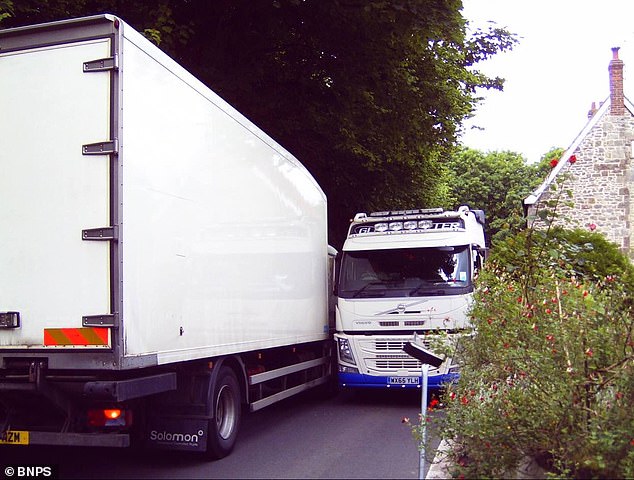
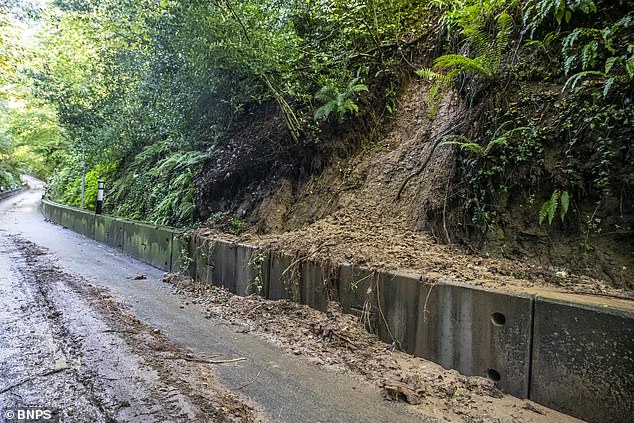
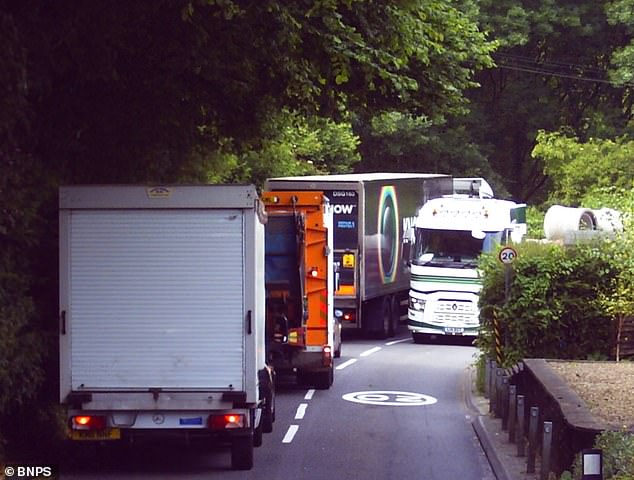
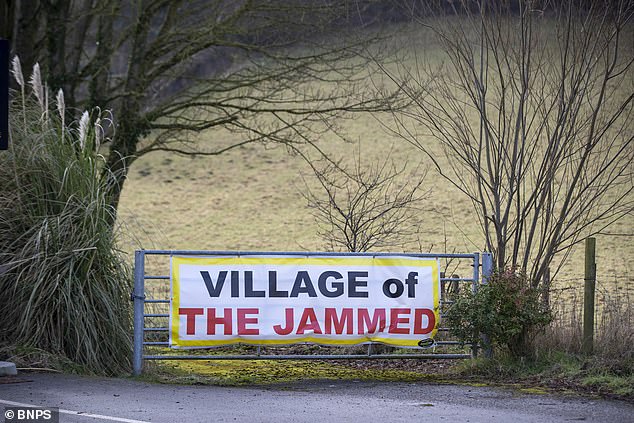
Dorset Council has identified the risk of landslips on a steep embankment and plans to spend £8m to stabalise it.
The project will see nearly 1,000 trees felled and the bank reinforced with large steel soil nails driven into it.
Ahead of the planned work, the entire road has been closed off for five days while a bat survey of the condemned trees takes place.
Derek Coombes, the vice chairman of the Melbury Abbas Parish Council, said: ‘Dorset Council say the bank is unsafe and a car could be crushed if it collapsed.
‘I have been here for 30 years and any fall I have seen has been absolutely minimal.
‘But if the bank has been weakened it is because the lorries that make a hell of a vibration when they drive through the hollow.
‘They should leave the bloody road alone and send the HGVs onto the A350.
‘It is a C-class road but we now get over 700 vehicles going through here in an hour. In rush hour there is always something happening.
‘One lorry coming down the hill towards my house lost control and took out 100ft of my hedge.
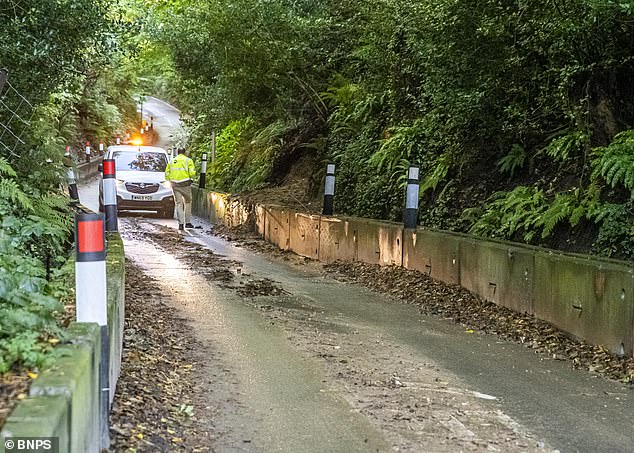
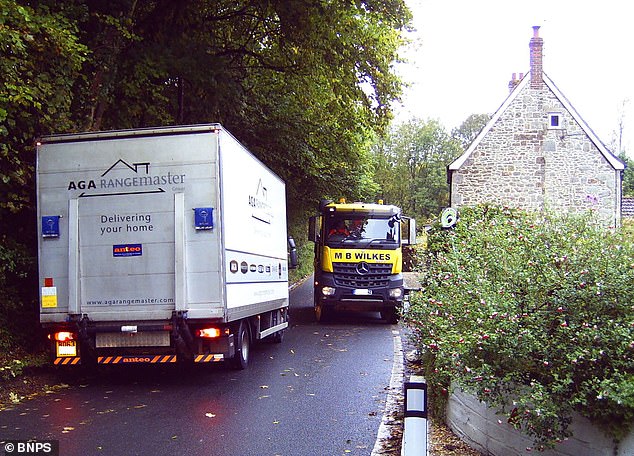
‘The council is compulsory purchasing the banks either side of the C13 from the landowners. They will be felling 1,000 trees, spraying chemicals and piling stakes into the bank and putting in wire netting.
‘The council seems to think this will work.
‘But the trees take most of the water run off that goes down to the river so where will that go now?
‘They have just closed the road for five days to do a bat survey. People have been trying to count bats in the day time.
‘Meanwhile, the road closure caused traffic to build up elsewhere. It’s a joke.’
Local resident Tamsin Reynolds responded to the proposed £8m work by posting on social media: ‘So all the wildlife in this area will be poisoned with the chemicals they are using to kill the vegetation on the banks.
‘It’s bloody disgusting, all the trees felled and land flattened.’
She claimed the village has been made a scapegoat for the council’s decision to remove the 7.5 ton weight limit for vehicles using the C13.’
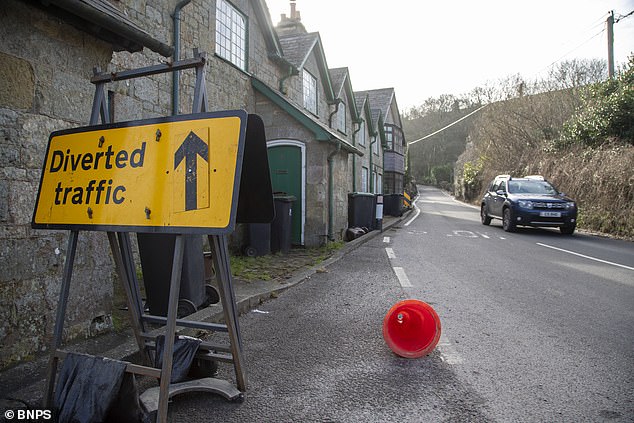
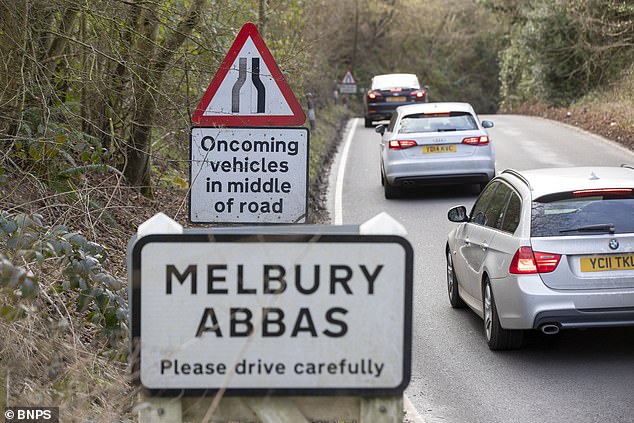
But a Dorset Council spokesperson maintained that HGVs using the C-road have not caused the weakening of the embankment.
They said: ‘This matter was raised during the recent Compulsory Purchase Order Public Enquiry.
‘In summary, Heavy Goods Vehicles have not been identified as the root cause of slope instability at Dinah’s Hollow.
‘However, we did commission [an engineering firm] to assess the potential impact of HGV traffic on slope stability.
‘The findings were published during the public enquiry, confirming that most slope failures in the UK are triggered by changes in groundwater or rainfall, not vibration, and that vibration from HGVs is a less common cause of slope instability.
‘The assessment also concluded that the proposed soil nailing scheme will effectively mitigate any vibration-related risks from HGVs.’
Councillor Jane Somper, who represents Melbury Abbas on Dorset Council, said the local authority had to act now.
She said: ‘As far as the council were concerned, a failure to act would mean a corporate manslaughter question, should there be an incident, and ownership of land moved to the council, lifts the liability from the landowners.’
The narrow road sits just over a mile away from one of Britain’s bendiest roads – Zig Zag Hill, famous for its hairpin turns and steep inclines.








